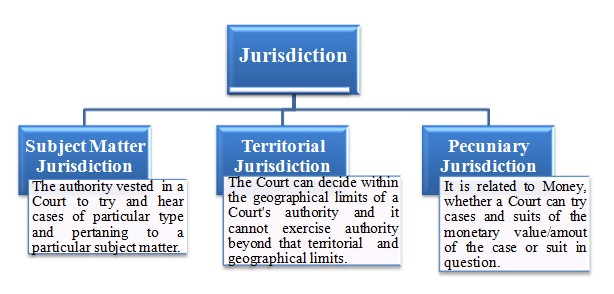In simple words jurisdiction can be defined as the limit of judicial authority or the extent to which a court of law can exercise its authority over suits, cases, appeals and other proceedings. The rationale behind introducing the concept of jurisdiction in law is that a court should be able to try and adjudicate only in those matters with which it has some connection or which falls within the territorial or pecuniary limits of its authority.
Section 9 of the Civil Procedure Code, 1908 confers jurisdiction over the civil courts to adjudicate upon all suits of civil nature, except such suits the cognizance of which is either expressly or implied barred. In other words whenever the object of the proceedings is the enforcement of civil rights, a civil court would have jurisdiction to entertain the suit unless the cognizance of the same is barred through a legislative instrument.

Disputes relating to property, breach of contracts, wrongs committed in money transactions, etc. are categorized as civil wrongs and could be subject to a civil process. In such cases civil suits should be instituted by the aggrieved persons. Civil wrongs are redressed before civil courts by granting injunctions or by payment of damages or compensation to the aggrieved party. As a matter of fact, every suit should be instituted before the court of lowest jurisdiction. In the civil side the Munsiff’s Court is the court of lowest of the jurisdiction.
Hence, it is clear that the jurisdiction of the Civil Court does not extend to all matters but might be limited in certain cases. Thus, the current position regarding the jurisdiction of Civil Courts is that they have inherent jurisdiction to heat into all civil matters unless it is expressly or implied excluded by a statute.

